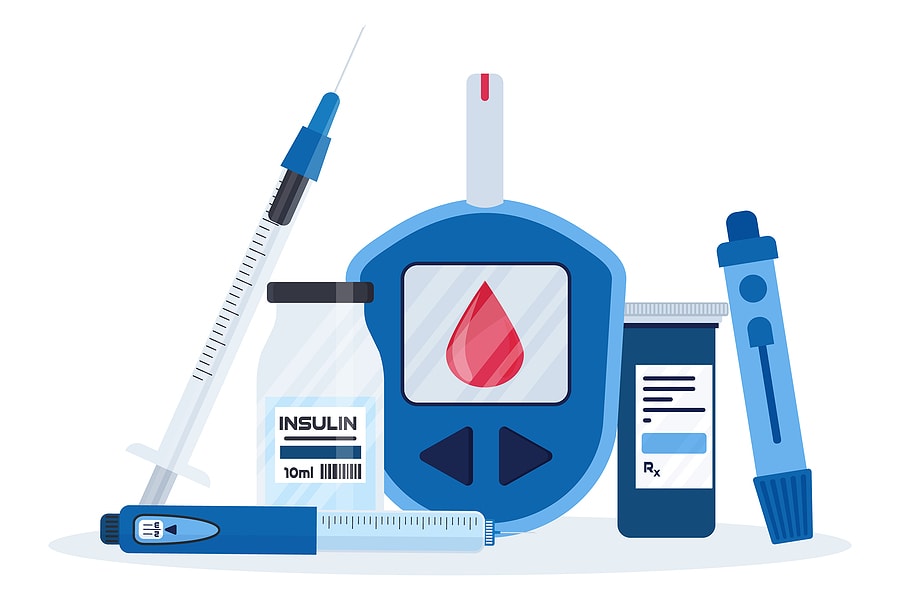What Is The Purpose Of Insulin In Diabetes Management?

Insulin plays a vital role in the management of diabetes by effectively regulating blood sugar levels. Diabetes is a chronic metabolic disorder characterized by an inability to produce or properly utilize insulin, resulting in high blood glucose levels.
This article aims to explore the purpose of insulin in diabetes management, highlighting its importance in maintaining stable blood sugar levels. The discussion will encompass the different types of diabetes and the associated insulin deficiency, as well as the various methods of insulin administration.
Additionally, the article will address the significance of monitoring and adjusting insulin dosage, along with potential complications that may arise from insulin therapy. By providing a comprehensive overview, this article seeks to emphasize the importance of regular insulin therapy in effectively managing diabetes.
Key Takeaways
- Insulin plays a crucial role in diabetes management by customizing and tailoring insulin dosage to meet individual needs.
- Regular blood sugar monitoring and insulin adjustment are essential to assess the effectiveness of insulin therapy and prevent complications.
- Determining insulin dosage through carbohydrate counting and insulin-to-carb ratio helps control blood sugar levels and maintain glycemic control.
- Adherence to prescribed insulin therapy is crucial to minimize the risk of complications and maintain optimal glycemic control.
Insulin’s Role in Blood Sugar Regulation
Insulin plays a crucial role in regulating blood sugar levels in individuals with diabetes. One of its main functions is to facilitate the uptake of glucose from the bloodstream into cells, where it is used for energy production. By promoting glucose uptake, insulin helps to lower blood sugar levels and prevent hyperglycemia.
Additionally, insulin plays a role in weight management as it promotes the storage of excess glucose as glycogen in the liver and muscles. This helps to maintain a healthy body weight, as excessive glucose in the bloodstream can lead to weight gain.
Furthermore, insulin has an impact on heart health as it helps to regulate lipid metabolism. It promotes the storage of fatty acids in adipose tissue, preventing their accumulation in the bloodstream and reducing the risk of cardiovascular diseases associated with high levels of circulating lipids.
Overall, insulin is essential for maintaining blood sugar levels, managing weight, and supporting heart health in individuals with diabetes.
Types of Diabetes and Insulin Deficiency
This paragraph will discuss the types of diabetes and the role of insulin in each.
Type 1 diabetes is characterized by a lack of insulin production, as the immune system mistakenly attacks and destroys the insulin-producing cells in the pancreas. This insulin deficiency requires individuals with type 1 diabetes to rely on insulin injections or an insulin pump to regulate their blood sugar levels.
On the other hand, type 2 diabetes is associated with insulin resistance, meaning that the body’s cells do not respond effectively to insulin.
Type 1 Diabetes and Insulin Production
Type 1 Diabetes is characterized by the absence of insulin production in the body. This condition arises due to an autoimmune response that destroys the insulin-producing cells in the pancreas. As a result, individuals with type 1 diabetes have a deficiency or complete absence of insulin, a hormone responsible for regulating blood sugar levels.
The absence of insulin means that glucose cannot enter cells for energy production, leading to high blood sugar levels. To manage this condition, individuals with type 1 diabetes must rely on external insulin sources to replace the hormone their bodies cannot produce. This involves administering insulin through injections or using insulin pumps.
The purpose of insulin in diabetes management for individuals with type 1 diabetes is to regulate blood sugar levels and prevent the complications associated with hyperglycemia. Proper insulin management is crucial in preventing complications of hyperglycemia.
Type 2 Diabetes and Insulin Resistance
One of the key factors contributing to the development of type 2 diabetes is the body’s reduced sensitivity to the effects of a hormone that plays a crucial role in blood sugar regulation. This hormone is insulin, which is produced by the pancreas and helps to transport glucose from the bloodstream into the cells for energy. In individuals with type 2 diabetes, the body becomes resistant to the effects of insulin, leading to elevated blood sugar levels. To manage insulin resistance, lifestyle modifications such as regular exercise, a healthy diet, and weight loss are often recommended. Additionally, medications may be prescribed to enhance insulin sensitivity or increase insulin production. By addressing insulin resistance, individuals with type 2 diabetes can better regulate their blood sugar levels and reduce the risk of complications associated with the condition.
| Insulin Resistance Management | Insulin Resistance Causes |
|---|---|
| Regular exercise | Obesity |
| Healthy diet | Sedentary lifestyle |
| Weight loss | Genetics |
| Medications | Aging |
| Ethnicity |
How Insulin Helps Maintain Stable Blood Sugar Levels
Insulin plays a crucial role in diabetes management by helping to regulate and stabilize blood sugar levels, ensuring that they remain within a healthy range.
Insulin’s role in glucose metabolism is essential as it facilitates the uptake and utilization of glucose by cells throughout the body.
In individuals with diabetes, there is either insufficient production of insulin or the body’s cells become resistant to its effects. Without adequate insulin, glucose cannot enter cells, leading to high blood sugar levels.
This chronic elevation of blood sugar can have detrimental effects on overall health, including damage to blood vessels, nerves, and organs.
By administering exogenous insulin, either through injections or an insulin pump, individuals with diabetes can overcome insulin deficiency or resistance.
This supplementation helps to maintain stable blood sugar levels, preventing hyperglycemia and its associated complications.
Insulin Administration Methods
Insulin administration methods play a crucial role in diabetes management.
Insulin injections are a commonly used method, where insulin is injected into the subcutaneous tissue using a syringe or insulin pen. This method allows for precise dosing and flexibility in timing.
Another method is insulin pumps, which deliver a continuous flow of insulin throughout the day via a small device attached to the body. This method provides a more consistent insulin level and allows for easy adjustments in dosage.
Insulin Injections
Administered through injections, insulin plays a crucial role in the management of diabetes. To effectively manage diabetes, it is important to carefully control insulin dosage.
The following are some key aspects of insulin injection techniques and dosage management:
- Selection of injection site: Insulin injections are typically given subcutaneously, into the fatty tissue just beneath the skin. Common injection sites include the abdomen, thighs, and upper arms. Regular rotation of injection sites helps prevent the development of lipohypertrophy, a condition characterized by the thickening of fatty tissue.
- Needle length: The length of the needle used for insulin injections may vary depending on factors such as body size and the desired injection site. Shorter needles are commonly used for subcutaneous injections, while longer needles may be required for individuals with more body fat.
- Injection angle: Insulin injections are typically administered at a 90-degree angle to ensure proper subcutaneous delivery. However, in individuals with little subcutaneous fat, a 45-degree angle may be more appropriate.
- Injection technique: Proper injection technique involves gently pinching the skin and inserting the needle quickly and smoothly into the subcutaneous tissue. After injecting the insulin, the needle should be left in place for a few seconds to ensure complete delivery before withdrawing.
By following appropriate insulin injection techniques and dosage management, individuals with diabetes can effectively control their blood sugar levels and improve their overall health.
Insulin Pumps
Insulin pumps, a popular alternative to injections, offer individuals with diabetes a convenient and precise method of delivering the necessary medication for blood sugar control. These devices provide several benefits over traditional insulin injections.
Firstly, insulin pumps deliver a continuous supply of insulin, mimicking the natural release of the hormone by the pancreas. This allows for better blood sugar management throughout the day, minimizing the risk of hypoglycemia and hyperglycemia.
Additionally, insulin pumps enable users to customize their insulin delivery based on their individual needs. The technology allows for different basal rates, which can be adjusted to match the body’s varying insulin requirements. This level of flexibility is particularly advantageous for individuals with irregular schedules or those who engage in physical activities.
Overall, insulin pumps offer improved convenience, precision, and customization, enhancing diabetes management for many patients.
Monitoring and Adjusting Insulin Dosage
This paragraph discusses the key points of blood sugar testing, carbohydrate counting, and insulin-to-carb ratio in monitoring and adjusting insulin dosage.
Blood sugar testing involves regularly measuring the level of glucose in the blood to assess the effectiveness of insulin therapy.
Carbohydrate counting is a method used to determine the amount of insulin needed based on the number of carbohydrates consumed.
Insulin-to-carb ratio is a calculation that helps individuals determine the appropriate insulin dosage based on the amount of carbohydrates they plan to consume.
Blood Sugar Testing
Blood sugar testing plays a crucial role in diabetes management as it allows individuals to monitor their glucose levels and make informed decisions about their treatment plans. By regularly monitoring blood sugar levels, individuals with diabetes can assess the effectiveness of their current treatment regimen and determine if any adjustments are necessary.
This information enables healthcare professionals to tailor insulin dosage and other interventions to meet the individual’s specific needs. Blood sugar monitoring also helps individuals understand how their daily activities, such as exercise or diet, impact their glucose regulation. This knowledge empowers individuals to make informed choices about their lifestyle and treatment strategies, leading to better overall diabetes management.
Additionally, monitoring blood sugar levels can help identify trends or patterns that may require further investigation or adjustment in the treatment plan, ensuring optimal control of blood sugar levels and minimizing complications associated with diabetes.
Carbohydrate Counting and Insulin-to-Carb Ratio
Carbohydrate counting and determining the insulin-to-carb ratio are essential components of effective glucose monitoring and treatment planning in individuals with diabetes.
Carbohydrate management plays a crucial role in diabetes management as carbohydrates are the main macronutrient that significantly impacts blood glucose levels. By accurately counting carbohydrates, individuals with diabetes can better control their blood sugar levels and adjust their insulin dosing accordingly.
To facilitate carbohydrate counting, individuals with diabetes often use food scales or measuring cups to portion out their carbohydrate-containing foods. This allows them to have a precise estimate of the amount of carbohydrates they are consuming.
Furthermore, determining the insulin-to-carb ratio helps individuals calculate the appropriate amount of insulin to administer based on the number of carbohydrates they consume. This ratio is personalized for each individual and helps maintain blood glucose levels within the target range.
Incorporating carbohydrate counting and determining the insulin-to-carb ratio into diabetes management empowers individuals to make informed decisions about their diet and insulin dosing, enabling better blood glucose control.
Potential Complications of Insulin Therapy
One potential complication of insulin therapy in diabetes management is the risk of hypoglycemia, a condition characterized by abnormally low blood sugar levels. Insulin is a hormone that helps regulate blood sugar levels in the body. When too much insulin is administered or when there is an imbalance between insulin dosage and carbohydrate intake, hypoglycemia can occur.
This condition can be dangerous and can lead to symptoms such as dizziness, confusion, sweating, and in severe cases, loss of consciousness or seizures. It is important for individuals using insulin therapy to monitor their blood sugar levels regularly and adjust their insulin dosage accordingly. Additionally, education and awareness about the signs and symptoms of hypoglycemia are essential for prompt and appropriate intervention to prevent complications.
Importance of Regular Insulin Therapy in Diabetes Management
Regular adherence to prescribed insulin therapy is crucial for maintaining glycemic control and preventing the onset of complications in individuals with diabetes. Insulin plays a vital role in diabetes management as it helps regulate blood sugar levels. When insulin is lacking or ineffective, as in the case of diabetes, the body is unable to properly metabolize glucose, leading to elevated blood sugar levels.
By regularly administering insulin, individuals with diabetes can effectively control their blood sugar levels and prevent hyperglycemia. This is important because prolonged hyperglycemia can lead to serious complications such as cardiovascular disease, kidney damage, nerve damage, and vision problems.
Regular insulin therapy helps to minimize the risk of these complications and allows individuals with diabetes to lead healthier and more fulfilling lives. Therefore, it is imperative for individuals with diabetes to adhere to their prescribed insulin therapy regimen to achieve optimal glycemic control and prevent the onset of complications.
Frequently Asked Questions
What are the common side effects of insulin therapy?
Common side effects of insulin therapy include hypoglycemia, weight gain, injection site reactions, and allergic reactions. Long-term effects may include insulin resistance, lipohypertrophy, and increased risk of developing cardiovascular diseases and other complications.
Can insulin therapy cure diabetes?
Insulin therapy is an essential treatment for diabetes management, but it cannot cure the disease. It helps regulate blood sugar levels, but there are limitations and long-term effects associated with its use.
How often should insulin dosage be adjusted?
Insulin dosage adjustments should be made based on individual needs, considering factors such as blood glucose levels, physical activity, diet, and stress. The frequency of adjustments varies depending on these factors and the specific insulin regimen.
Are there any alternative treatments to insulin for managing diabetes?
Alternative therapies and natural remedies can be used as adjunctive treatments for managing diabetes. However, it is important to note that insulin remains the primary and most effective therapy for controlling blood sugar levels in individuals with diabetes.
Can insulin therapy lead to weight gain?
Insulin therapy, a common treatment for diabetes, can lead to weight gain. Insulin promotes glucose uptake by cells, which can result in increased fat storage. Consequently, weight management is an important consideration in insulin therapy for individuals with diabetes.









